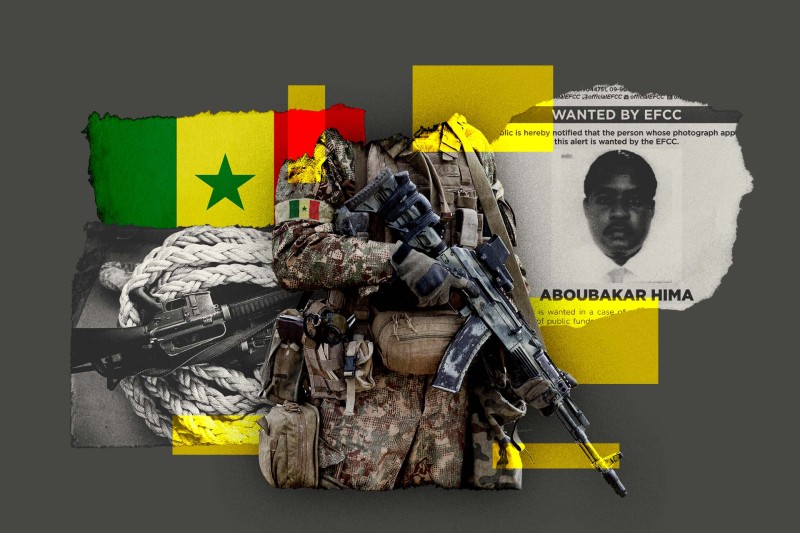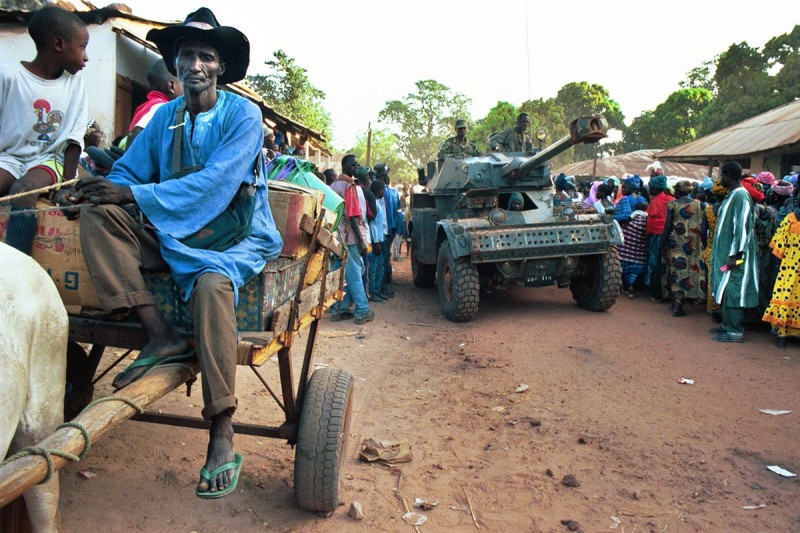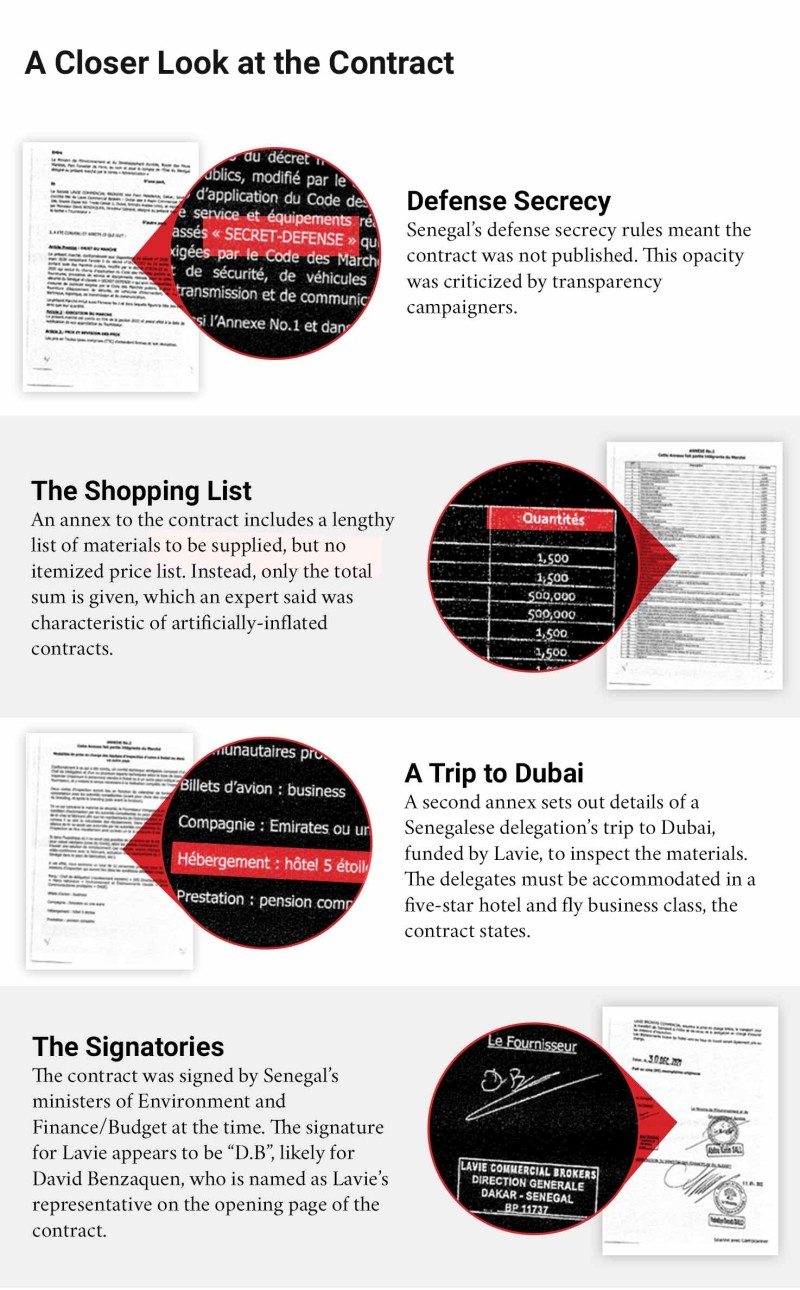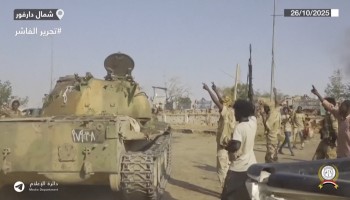At the beginning of this year, a Senegalese state agency signed a deal to purchase $77 million worth of assault rifles, semi-automatic pistols, ammunition, and other weapons from a little-known local firm that had only been set up a couple months earlier.
The contract was unusual in other ways, too. The agency that bought the arms was not the military, but the Environment Ministry. Still, the contract was never put out to bid, and once the deal was signed it was kept quiet, ostensibly due to Senegal’s defense security law. But OCCRP, in partnership with the Israeli newspaper Haaretz, learned of the deal and obtained a copy of the contract.
The supplier of the arms, Lavie Commercial Brokers, turns out to have been set up by the notorious West African businessman Aboubakar Hima, who is suspected of siphoning millions from inflated arms deals in Nigeria and his home country of Niger. An expert who discussed the Senegal deal with OCCRP reporters said irregularities in the contract suggested its price might also have been inflated.
Hima, who is often known by the nickname “Petit Boubé,” is no stranger to controversy. He has had some of his millions seized by the U.S. and South African authorities over illicit arms deals, and is wanted in Nigeria for his alleged role in making fraudulent arms deals with the government. In 2020, OCCRP revealed that a Nigerien government audit found Hima had brokered corrupt arms deals worth $240 million.
Perhaps conscious of his own notoriety, Hima may have sought to disguise his involvement in the Senegalese arms contract. While he is the only person named on registration documents for Lavie Commercial Brokers, the contract was signed on his firm’s behalf by Israel-based David Benzaquen, the company’s general manager.
Benzaquen founded an Israeli company called Lavie Strategies, which is licensed to export weapons by Israel’s Ministry of Defense. He is a former employee of Israeli arms dealer Gabi Peretz, a close friend of Senegal’s President Macky Sall. Peretz is known to supply military equipment to countries in West and Central Africa. Around the time that Hima’s firm obtained the Senegal contract, Peretz offered a 300-million-euro credit line to the Senegalese military, according to the Africa Intelligence news outlet.
In an emailed response to questions, Peretz said he had not had any contact with Hima since at least 2015 and had no knowledge of Lavie Commercial Brokers. He said Benzaquen had not worked for him since 2018 and “does not represent us,” and that he had no knowledge of Lavie’s contract in Senegal.
C’est Lavie
Senegal has been fighting a decades-long armed conflict with rebels in the southern Casamance region, along its borders with Gambia and Guinea-Bissau. Guerilla groups in the forests have smuggled timber and cannabis to finance themselves, and Senegalese forest rangers — overseen by the Environment Ministry — must arm themselves as a result. But experts questioned whether the Environment Ministry should have signed such a large and secretive weapons contract.
“We can ask ourselves the question if it is really necessary [for forest rangers to have assault rifles],” said Professor Semou Ndiaye, a consultant and researcher in corruption and good governance. “[The arrangement] is opaque. It is a deal that is directly arranged and naturally, there is a risk of corruption…the authorities can do as they see fit and there is a heightened risk of overpricing [of contracts].”
An analyst with experience in the security sector in Senegal, who asked not to be named as he was not authorized to speak to reporters, said it was “very unlikely” the Environment Ministry would need to spend tens of millions on arms.
“There have been recent increases in fighting between the army and rebels in Casamance, but I am not aware of any major incidents with the forest rangers,” he said. “I don’t think such a big contract should be signed by a single ministry without the involvement of security forces. And the Environment Ministry is obviously not buying weapons for the army.”
Experts also said it was surprising and problematic that Senegal would ink a major arms deal with a dealer found to be defrauding other governments.
“No responsible buyer, whether a government agency or a private company, does business with an individual who has a record of fraudulent dealing,” said Richard Messick, a former senior operations specialist at the World Bank who now consults for international organizations on legal development and anticorruption.
“It may be that the accusations against Mr. Hima are without merit. A responsible buyer would make absolutely sure of that before contracting with him,” he added.
Abdou Karim Sall and Aboulaye Daouda Diallo, who signed the contract in their respective roles as Minister of Environment and Minister of Finance at the time, did not respond to multiple requests for comment.
OCCRP could not reach Hima for comment. Reporters sent detailed questions to Hima’s Nigerian lawyer Kayode Ajulo, but he refused to pass them on to his client. “I don’t run such errands,” he said.
Haaretz contacted Benzaquen by telephone, but he refused to respond to questions. Senegal’s Ministries of Environment and Finance did not respond to written questions.
From Paper to Bullets
Hima’s path to West African arms dealer was an unconventional one, aided by his marriage and the necessities of war.
His first known business was Imprimerie du Plateau, a printing firm he set up in Niger in 2003.
In 2005 he married the daughter of the country’s former president, Ibrahim Bare Maïnassara, who had been killed in a coup some years earlier. The marriage brought him closer to Niger’s political establishment, and by 2010 he was in the arms business in neighboring Nigeria.
In Nigeria, Hima made a fortune during the 2010-2015 administration of President Goodluck Jonathan. He worked frequently with Sambo Dasuki, a national security adviser to the Jonathan government who was later accused of mismanaging $2.1 billion connected to arms deals.
Hima set up a Nigerian arms-dealing firm, Societe D'Equipments Internationaux Nigeria Ltd, in May 2014, not long after nearly 300 Nigerian schoolgirls were abducted by Boko Haram Islamic militants. Facing immense pressure to rescue the girls but under a U.S. arms embargo, the Nigerian government turned to brokers like Hima.
Between 2014 and 2015, Hima netted over $400 million in fraudulent arms contracts, according to the country’s Economic and Financial Crimes Commission, which claimed he received government money for the purchase of military equipment for Nigerian forces but didn’t supply all of the gear.
Hima allegedly bribed Nigerian military officers to win these contracts, according to Nigerian court records. One was Alkali Mohammadu Mamu, a former group managing director of the Nigerian air force’s holding company, who was found guilty of corruption after taking $300,000 in currency and an unknown number of cars from Hima.
The Nigerian findings were similar to the findings of the Inspection Générale des Armées, an independent body that audits the armed forces in Niger. Auditors, looking at the period 2011 to 2019, discovered that many deals Hima facilitated in that country were significantly overpriced and the equipment was sometimes never delivered. Those deals by Hima, according to the audit report, were worth $240 million.
Procurement Problems
Red Flags and Five-Star Travel
OCCRP could not confirm whether the weapons in the Senegal deal have been delivered, but the contract covers a wide range of materials and services, from guns and ammunition to boats, pick-up trucks, cars, uniforms, and even drone training courses. Lavie Commercial Brokers agreed to finance the deal upfront, with the Senegalese authorities then paying the company in installments of about 9.06 billion CFA francs ($15.4 million) annually until 2026.
The Senegal deal also provides for two Lavie-funded trips to Dubai for a six-person Senegalese delegation, so that officials can inspect the items before their delivery to Senegal. The contract says the officials are to travel business class and stay at a five-star hotel.
Experts said the contract has red flags for artificially inflated pricing — the same offense that Hima was previously accused of in Niger and Nigeria. Most concerningly, the costs are not itemized. Instead, only the single lump sum of 45.3 billion CFA francs ($77 million) is cited in the document.
“Good practice in any contract for goods or equipment is to itemize the price of the individual items,” said Messick, the former World Bank specialist and corruption expert.
”When a single price is quoted for numerous items…it is very hard to know whether the government is being overcharged.”
Richard Messick, Anticorruption Specialist
“When a single price is quoted for numerous items…it is very hard to know whether the government is being overcharged,” Messick told OCCRP.
Chidi Nwaonu, a defense expert with London-based Peccavi Consulting, also said the lack of price itemization in the contract was a red flag.
“The arms trade is traditionally opaque and corrupt but in Africa it is even more so as arms purchases are shrouded by ‘national security,’” he added.
A transparency campaign group representative in Senegal called for an investigation into the contract and warned of the damaging effect corruption has on the country.
“Corruption weakens the Senegalese state and compromises the development and stability of the country,” said Papa Fara Diallo, president of the Seneglese office of Publish What You Pay, a global coalition of pro-transparency campaigners. “Even if defense secrets mean certain pieces of information cannot be made public, that does not mean the authorities can allow acts of corruption or embezzlement of public money.”








